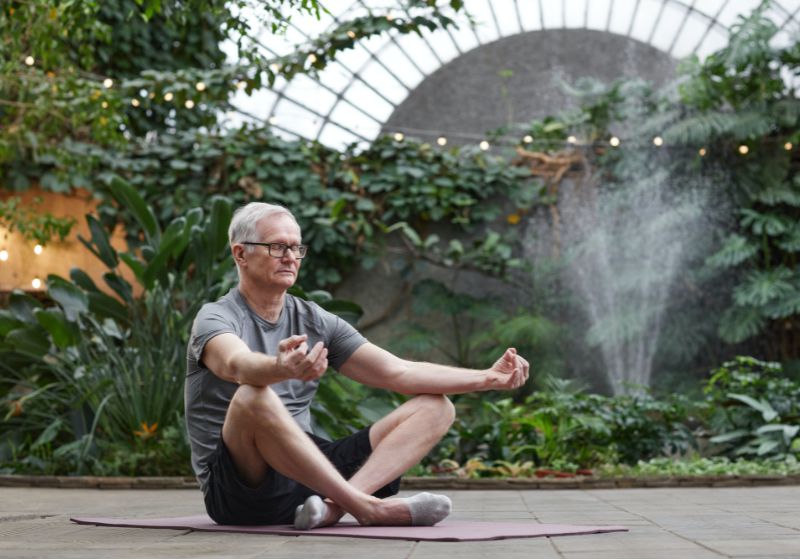In today’s fast-paced world, where distractions abound, and stress levels rise, embracing mindfulness has become increasingly vital, especially for seniors seeking to improve their quality of life. By integrating mindfulness into their daily routines, seniors can experience a profound sense of calm, reduce stress, and nurture their emotional well-being.
This article explores the transformative power of mindfulness for seniors. It offers practical tips and guidance on effectively incorporating mindfulness practices into their lives.
Understanding Mindfulness
Mindfulness is the practice of bringing one’s attention to the present moment with non-judgmental awareness. By cultivating mindfulness, seniors can experience a range of benefits that contribute to their overall well-being. In essence, mindfulness involves paying attention to thoughts, feelings, bodily sensations, and the surrounding environment. This fosters a deep sense of self-awareness and acceptance.
Core Principles and Practices
Mindfulness is rooted in principles such as non-judgment, acceptance, and curiosity. Practices like meditation, breath awareness, body scans, and mindful movement are commonly used to cultivate mindfulness and develop a heightened sense of awareness.
How Can Mindfulness Positively Impact Seniors’ Well-being?
For seniors, mindfulness can help reduce stress and anxiety, improve concentration and cognitive abilities, and promote emotional well-being. By fostering a greater sense of self-awareness and acceptance, seniors can better navigate the challenges of aging and find a greater understanding of peace and contentment in their daily lives.
The Physical Benefits of Mindfulness
Mindfulness practices not only have a positive influence on mental well-being. These also provide a multitude of physical benefits that can significantly improve the overall health and vitality of seniors.
1. Reducing stress and anxiety
By engaging in mindfulness techniques like deep breathing and body awareness, individuals can stimulate the body’s relaxation response, thereby reducing stress hormones and cultivating a calm state of being. This can play a role in enhancing cardiovascular health and reducing blood pressure levels.
2. Enhancing immune system function
Chronic stress weakens the immune system, making individuals more susceptible to illnesses. Mindfulness practice has been shown to strengthen immune function, supporting seniors in maintaining a robust defense against infections and diseases.
3. Promoting better sleep patterns
Mindfulness-based techniques, like progressive muscle relaxation and guided imagery, can promote better sleep quality by calming the mind and reducing anxiety. Improved sleep contributes to enhanced cognitive function, mood regulation, and overall physical well-being.
4. Managing chronic pain and physical discomfort
Mindfulness-based stress reduction techniques have effectively reduced pain intensity and improved pain coping mechanisms among seniors. By cultivating an attitude of non-judgmental awareness, seniors can better manage chronic pain and find relief without relying solely on medication.
The Emotional and Mental Benefits of Mindfulness
Mindfulness provides seniors with more than just physical benefits. It encompasses a wide array of emotional and mental advantages that contribute to their overall well-being and happiness.
1. Increasing self-awareness and emotional resilience
Mindfulness practices cultivate a deeper understanding of one’s thoughts, emotions, and reactions, allowing seniors to develop greater self-awareness and emotional intelligence. This increased awareness enables them to respond to challenging situations with resilience and choose more helpful and positive responses.
2. Enhancing cognitive abilities and memory
Consistent engagement in mindfulness practice has been linked to enhanced cognitive functions, including attention, concentration, and memory. Seniors can benefit from enhanced cognitive abilities, which can help with daily tasks, problem-solving, and maintaining mental sharpness.
3. Managing depression and promoting positive mood
Mindfulness-based interventions have shown promising results in reducing symptoms of depression and enhancing overall mood. By focusing on the present moment and cultivating a non-judgmental attitude, seniors can find relief from negative thoughts and emotions, leading to improved mental well-being.
4. Improving overall mental well-being
Mindfulness helps seniors develop a more positive and compassionate relationship with themselves and others, reducing feelings of loneliness, stress, and anxiety. This, in turn, promotes a sense of overall mental well-being, contentment, and improved quality of life.
Incorporating Mindfulness into Daily Life
The true power of mindfulness lies in its integration into daily life. By incorporating mindfulness into their routines, seniors can experience its transformative benefits on a regular basis.
Mindful breathing exercises
Seniors can begin their day by engaging in simple breathing exercises. these include deep belly breathing or the relaxing breathing technique, to cultivate a sense of calm and presence. These exercises can be practiced anytime, anywhere, providing a tool for immediate stress reduction and grounding.
Mindful movement and gentle exercises
Activities like yoga, tai chi, or gentle stretching offer an opportunity to combine movement with mindfulness. Seniors can enhance their physical well-being while fostering mindfulness by paying attention to the body’s sensations, breathing, and activities during these exercises.
Mindful eating and nutrition
Seniors can bring mindfulness to their meals by paying attention to the flavors, textures, and smells of the food they consume. Eating slowly, savoring each bite, and being fully present during mealtimes can promote healthier eating habits and a more mindful relationship with food.
Mindful relaxation techniques
Incorporating relaxation techniques such as body scans, guided meditations, or progressive muscle relaxation before bedtime can help seniors wind down, release tension, and prepare for a restful night’s sleep. These practices promote deep relaxation and facilitate a sense of inner calm.
Mindfulness in Social Interactions
Mindfulness extends beyond individual practice and can greatly enhance seniors’ social interactions, fostering deeper connections and meaningful relationships.
Cultivating mindful communication
Mindful listening and speaking with full attention and presence can enhance communication and understanding. Seniors can practice being fully present and attentive during conversations, listening without judgment, and responding with compassion and empathy.
Building empathy and compassion
Mindfulness cultivates a sense of empathy and compassion towards oneself and others. Seniors can extend kindness and understanding to those around them, fostering deeper connections and creating a more harmonious social environment.
Strengthening social connections and relationships
By being fully present in social interactions, seniors can nurture meaningful connections and build stronger relationships with family, friends, and community members. Mindfulness helps seniors appreciate the value of connection and invest in fostering supportive and fulfilling bonds.
Overcoming Challenges and Building Consistency
Incorporating mindfulness into daily life can sometimes present challenges. But with perseverance and the right approach, seniors can overcome these obstacles and establish a consistent mindfulness practice.
Addressing common barriers to mindfulness practice
Seniors may face challenges such as distractions, racing thoughts, or difficulty finding time for exercise. It’s important to acknowledge these barriers and find strategies to overcome them, such as creating a dedicated space for mindfulness practice or setting reminders to engage in mindful activities.
Setting realistic goals and expectations
Seniors should approach mindfulness with realistic goals and expectations. It’s important to remember that mindfulness is a lifelong journey, and progress may come gradually. By setting achievable goals and acknowledging each step of progress, seniors can maintain motivation and build consistency.
Establishing a supportive routine and environment
Seniors can establish a consistent mindfulness practice by integrating it into daily routines. Designating specific times for training and creating a space conducive to mindfulness, such as a quiet and peaceful space, can help seniors stay committed and focused on their practice.
Mindfulness Resources and Programs for Seniors
Numerous mindfulness resources and programs are designed to support seniors in their mindfulness journey, providing guidance and community.
Mindfulness apps and guided meditation resources
Seniors can explore various mindfulness apps and guided meditation resources available on smartphones and tablets. These apps offer a wide range of guided meditations, breathing exercises, and mindfulness activities, allowing seniors to access mindfulness practices anytime, anywhere.
Community-based mindfulness programs for seniors
Many community centers, senior centers, and wellness organizations offer mindfulness programs tailored to seniors. These programs often include group meditation sessions, mindfulness workshops, and educational sessions, providing an opportunity for seniors to learn and practice mindfulness in a supportive group setting.
Online resources and support networks
Online platforms provide seniors with a wealth of mindfulness resources, including articles, videos, and virtual mindfulness courses. Seniors can access online communities and support networks to connect with like-minded individuals, share experiences, and receive guidance from experts in the field.
The Bottom Line
Incorporating mindfulness into the lives of seniors can lead to a range of physical, emotional, and mental benefits. By practicing mindfulness techniques and embracing mindful living, seniors can reduce stress, enhance cognitive abilities, strengthen relationships, and improve overall well-being, ultimately enjoying a higher quality of life. So, start cultivating mindfulness today and unlock its transformative power for seniors.
Author bio

Evelyn K. Grier is a writer and editor with years of experience in the healthcare industry. She has worked with a variety of firms, including Springhive Web Design Company, where she currently serves as a writer for Home Health Care Clients. One client Evelyn has served at Springhive is Serenity Senior Care, a Home Care Agency that provides elderly care, home health care, disability services, and health-related topics. As part of her work for Serenity Senior Care, Evelyn has written dozens of articles on how to take care of elderly family members and friends dealing with health issues. Evelyn loves watching movies, reading, and hiking in her free time.
Evelyn graciously contributed this article to the Living to 100 Club library of resources for seniors. Thanks for her contribution.


